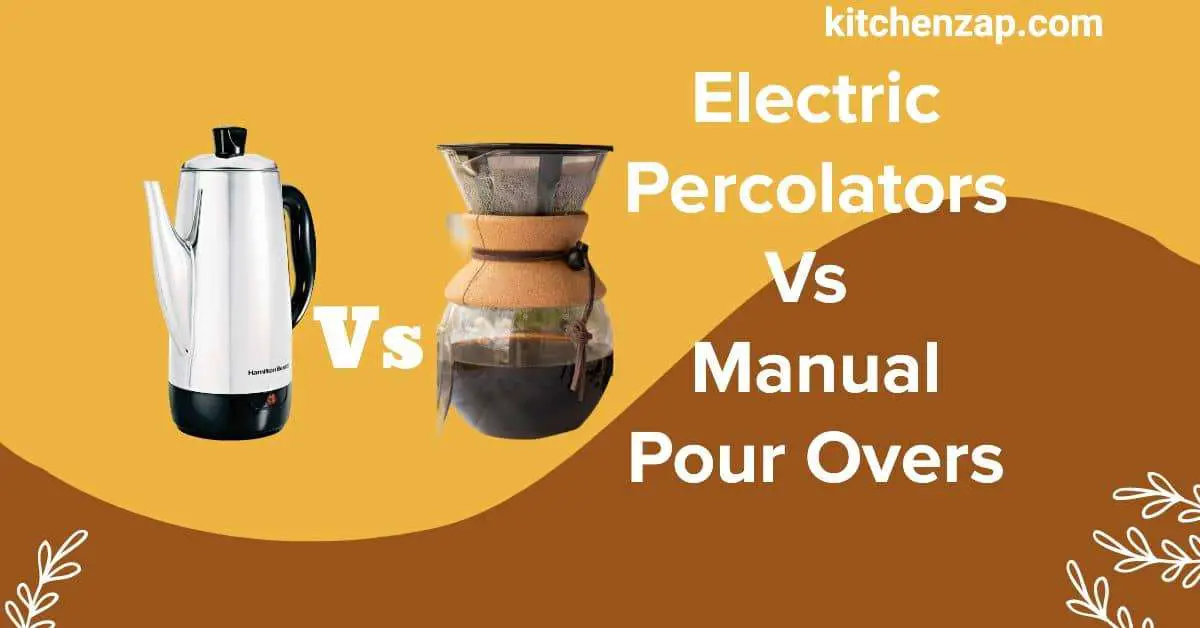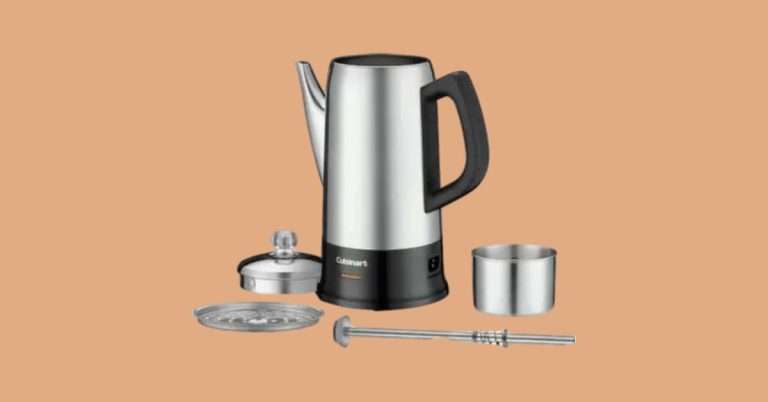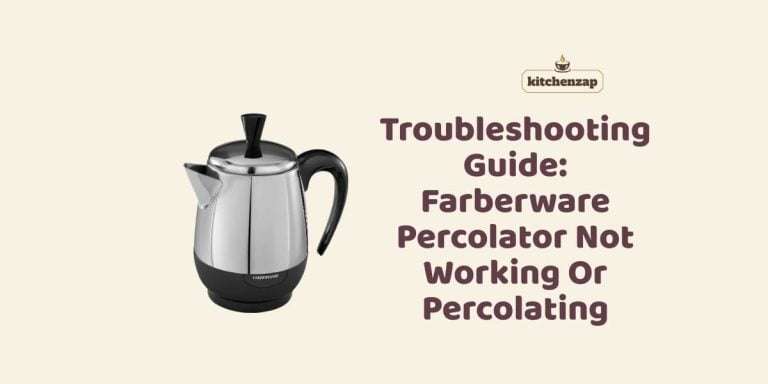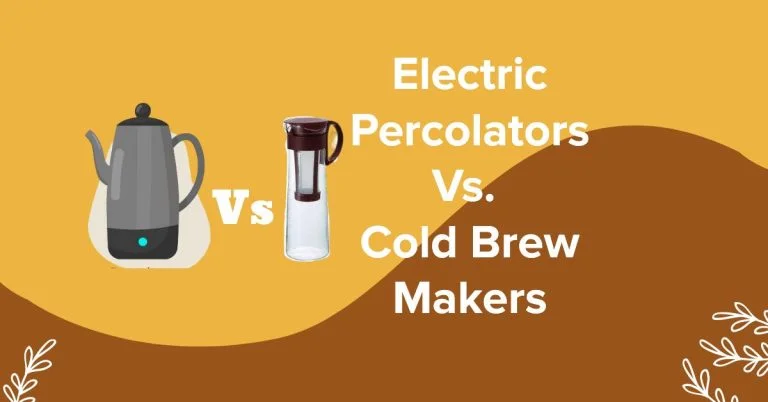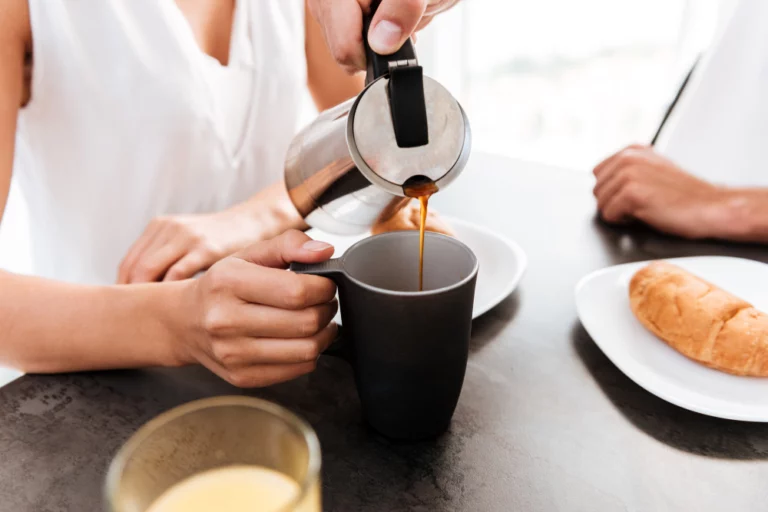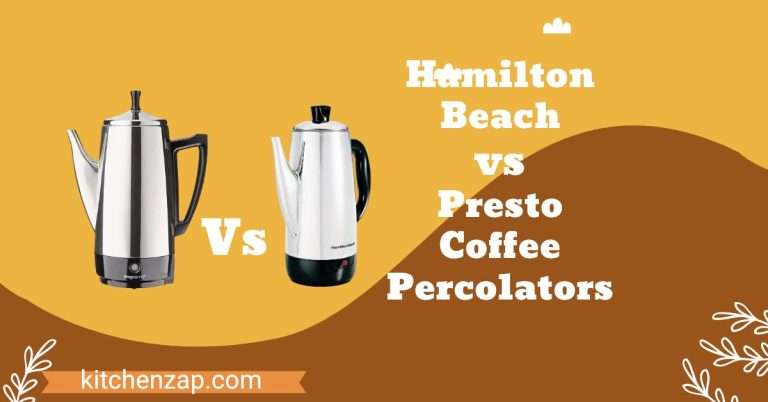20 Key Differences Between Electric Percolators Vs Manual Pour Overs
Electric percolators and manual pour-over coffee makers usually clash in the long-running debate about producing an ideal morning espresso.
Both processes have advantages and disadvantages, and the decision is based on personal tastes and desires. To help you decide, we created this article to examine the differences between electric percolators vs. manual pour overs coffee makers.
Moreover, brewing time, temperature control, filtration, volume, portability, simplicity of usage, cleaning, longevity, taste, aesthetics, noise level, grinding size, and other characteristics will be examined.
Upon reading this, you will better understand every method’s advantages and disadvantages. You will also be capable of making a sound choice about which one is best for you.
Electric Percolators vs. Manual Pour Over: Which Is Better?
If you are wondering what coffee maker you should buy, the following is your guide to make the best decision.
1. Brewing Procedure: How Electric Percolators and Manual Pour Overs Differ
Electric coffee percolators use a cycle cooling and heating mechanism to brew coffee. In a closed cycle, the water is heated and pumped through the coffee grounds until it achieves the appropriate strength.
On the contrary, manual pour over coffee makers employ a manual pouring technique in which hot water is passed through the coffee grounds in a slow, constant stream.
2. Brewing Time: Electric Percolators Vs Manual Pour Overs
Electric coffee percolators brew coffee slower than manual pour over coffee makers. To brew a full cup of coffee, the percolation cycle with electric coffee percolators may complete up to 10-15 minutes. However, manual pour over coffee machines create a single cup of coffee in only a few minutes.
Table of Comparison 1
| Feature | Electric Percolator | Manual Pour Over |
|---|---|---|
| Brewing method | Cyclical | Manual Pouring |
| Brewing time | Longer | Faster |
| Temperature control | Precise | Less precise |
| Filtering | Metal | Paper/Mesh |
| Capacity | Large | Smaller |
| Portability | Less portable | More portable |
| Ease of use | Complex | Simple |
| Cleaning | More frequent | Less frequent |
| Durability | More durable | Less durable |
| Flavor | Stronger/Purer | Milder |
| Aesthetics | Traditional | Modern |
3. Temperature Regulation: Which Method is Better for Consistent Temperature?
Electric coffee percolators feature more accurate temperature management than manual pour over coffee makers. They have thermostats that keep the water temperature within a specific limit.
Meanwhile, manual pour-over coffee makers rely on the user to manage the water temperature by boiling the water to the proper temperature before brewing.
4. Filtration: Electric Percolators Vs Manual Pour Overs
When it comes to manual pour-over and electric coffee percolator filtration, they both use different materials. The electric coffee percolators remove coffee grounds from brewed coffee using metal filters, while manual pour over coffee machines strain the coffee grinds through paper or fixed metal mesh filtration.
In addition, paper filters must be replaced after every use, but permanent metal mesh filters may be reused if properly cleaned every time.
5. Capability: Which Method Brews More Coffee at Once?
When comparing manual pour over vs Are Coffee Percolators Worth It? How to Choose the Best One for Youpercolator coffee makers, electric percolators have a bigger capacity. It is because electric percolators could prepare up to 12-15 cups of coffee at a time, which makes it perfect for big families or celebrations.
On the other hand, manual pour-over coffee machines are meant to brew one or two cups of coffee at once and are better suited to people or small homes.
6. Adaptability: Which one is Better for Different Brewing Needs?
Electric coffee percolators are frequently less portable than manual pour-over coffee makers. Since they need an electrical outlet, they could be better for outdoor pastimes or travels.
Nevertheless, manual pour over coffee makers may be employed wherever there is hot water.
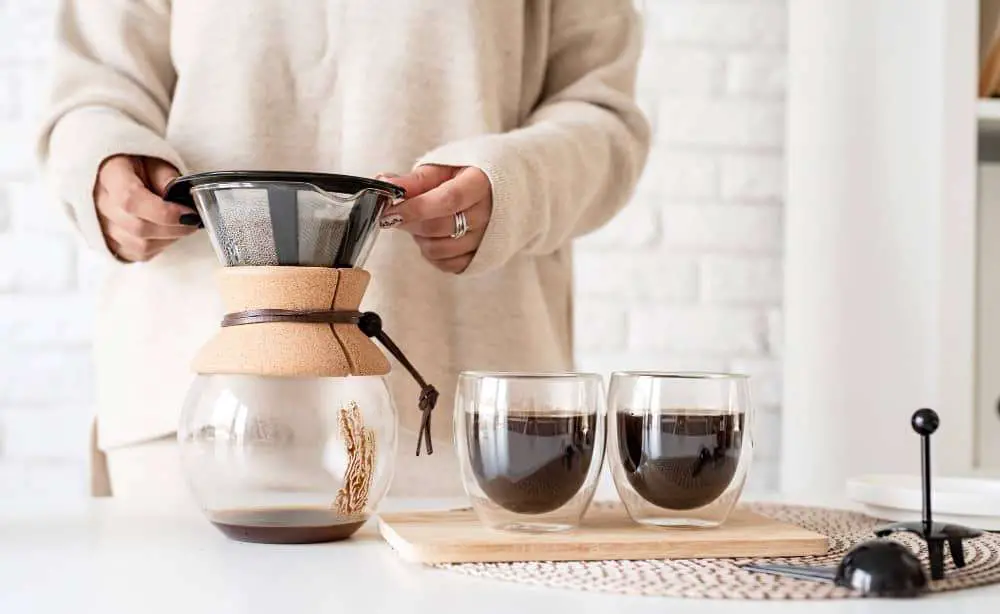
7. Usability: Which one is easier?
When comparing the electric percolators vs. manual pour overs, the manual pour over coffee is often seen to be more user-friendly. If using a manual pour-over coffee maker, the coffee grounds are steeped in hot water.
Meanwhile, an electric coffee percolator requires a more involved procedure of supplying coffee and water to the machine and regulating the brewing process.
8. Cleaning: Which Method is Easier to Clean?
Cleaning electric coffee percolators are more complex than cleaning manual pour-over coffee makers. The metal filters in electric coffee percolators may get blocked with time, resulting in a loss in coffee quality.
Hence it must be cleaned frequently to avoid the formation of mineral deposits. On the contrary, manual pour-over coffee makers need just the filter and carafe to be cleaned following each use.
9. Durability: Which Method is More Durable and Long-Lasting?
Electric coffee percolators are built to withstand heavy use and, with proper care, which can endure for several decades. On the contrary, manual pour-over coffee makers may be delicate and must be changed more regularly.
So when it comes to durability among manual pour-over and electric percolators, electric percolators are much more ideal.
Table of Comparison 2
| Feature | Electric Percolator | Manual Pour Over |
|---|---|---|
| Energy efficiency | Less efficient | More efficient |
| Features | Few | Few |
| Cost | More expensive | Less expensive |
| Noise level | Noisy | Quiet |
| Grind size | Medium | Medium-fine |
| Steeping time | Shorter | Longer |
| Pouring method | None | Manual |
| Control | Less | More |
| Type of coffee | All types | Light/Medium Roast |
10. Flavor: Which One Produces a Better-Tasting Coffee?
Several coffee lovers believe that coffee produced using electric percolators has a purer and stronger taste than coffee prepared with manual pour-over coffee makers.
Since the percolation method employed in electric coffee percolators enables a complete extraction of the coffee grounds, the taste is better and more full-bodied.
However, this is a personal choice, and several individuals might favor the lighter, more delicate taste profile of coffee produced using a manual pour-over coffee machine.
11. Aesthetics: Electric Percolators Vs Manual Pour Overs
Electric coffee percolators are frequently more conventional in appearance than manual pour-over coffee makers. They are commonly composed of stainless steel or other sturdy materials and have a vintage style reminiscent of a bygone period.
Meanwhile, manual pour-over coffee makers come in various shapes and materials, ranging from glass to ceramic to plastic, and may have a more modern look.
12. Percolator or Pour-Over Coffee Maker Features
Electric coffee percolators frequently include functions manual pour-over coffee makers don’t.
They could, for instance, feature programmed settings that enable users to personalize the brewing procedure, such as the duration of the brewing cycle and the intensity of the coffee.
They could additionally have an automatic shut mechanism that switches the machine off after the brewing cycle is over, becoming a helpful safety feature.
13. Energy Conservation: Which Method is More Energy-Efficient?
Manual pour-over coffee makers use less energy than electric coffee percolators. This is because they use the energy necessary to heat the water and don’t need electricity.
On the other hand, electric coffee percolators consume more energy to heat the water and sustain the brewing process, which might result in higher power costs.
14. Cost: Which Method is More Cost-Effective?
Among the factors people always consider is the cost before buying. By searching between pour over coffee maker vs. percolator, people found out that electric coffee percolators often cost more than manual pour-over coffee makers.
This is due to its more complex features, which need to employ additional components, including the heating element and inner brewing elements. On the other hand, manual pour-over coffee makers are more economical because of their simpler structure and fewer parts.
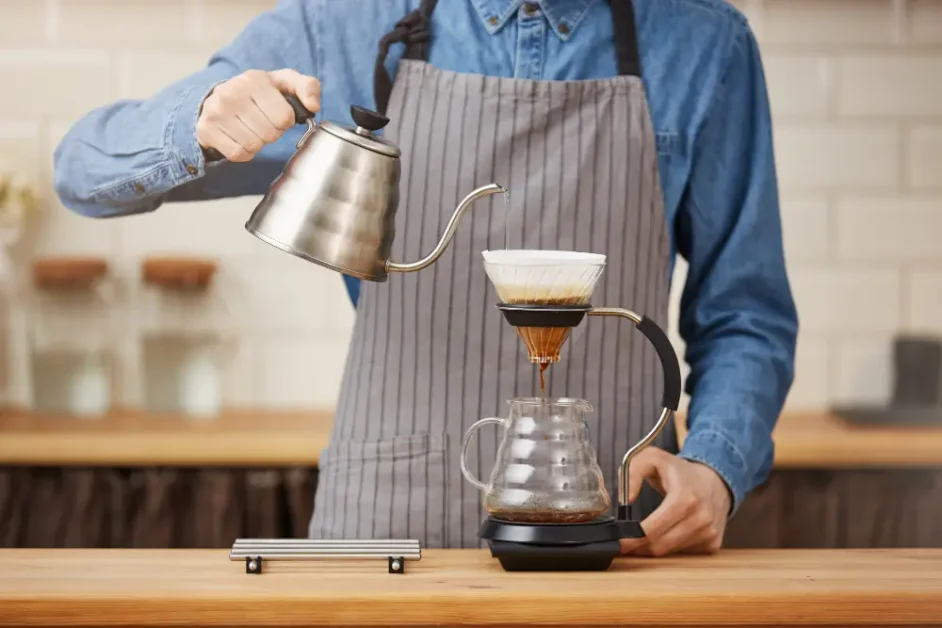
15. Noise Level: Which Method is Quieter During Brewing?
Electric coffee percolators are louder than manual pour-over coffee makers when brewing. This is because the percolation procedure includes boiling water and producing steam, which might make a bubbling sound or loud hissing.
On the other hand, manual pour-over coffee machines are silent and generate no noise throughout brewing.
16. Grind Size
To avoid the coffee being excessively bitter or over-extracted, manual pour-over coffee makers need a medium-fine grinding, while electrical percolators need a medium grind. On the contrary, manual pour-over coffee makers use a finer grind to enable a complete extraction of the coffee tastes and oils.
17. Steeping Period: Which approach produces a better-steeped coffee?
Manual pour-over coffee makers take much longer to steep than electric percolators. This is because hand pouring enables a more regulated and slow extraction of coffee oils and tastes.
On the other hand, electric coffee percolators employ a cyclical heating and cooling procedure to swiftly brew the coffee, which might lead to a quicker steeping period.
18. Pouring Technique: Which approach requires more skillful pouring?
Manual pour-over and electric coffee percolators both have different pouring technique. Manual pour-over coffee makers must be poured by hand, but electric coffee percolators don’t.
The operator can regulate the rate and direction of the water flow using a manual pour-over coffee maker, allowing for more exact extraction of the coffee flavors.
On the other hand, electric coffee percolators employ a predefined brewing cycle and instantly supply water, giving you less control through the brewing procedure.
19. Command: Which Method Gives You More Control Over the Brewing Process?
Manual pour-over coffee makers provide you greater control over the quality and taste of your brew than electric percolators.
You could adjust the grind size, pouring rate, and water temperature in a manual pour-over coffee maker to achieve the desired strength and flavor. On the other hand, electric coffee percolators have predefined settings and less human control throughout brewing.
20. Coffee Type: Which Method is Best for Different Types of Coffee Beans?
Manual pour-over coffee machines are great for medium and light-roasted coffee since they have more complex and delicate tastes that demand a gentler brewing technique.
Additionally, this coffee maker style enables a more regulated and soft extraction of these characteristics, leading to a more flavorful cup of coffee.
An electric coffee percolator may be a better choice when seeking a coffee maker capable of making all varieties of coffee. Darker roasts with stronger tastes that could sustain a more vigorous brewing procedure may also be brewed using this method.
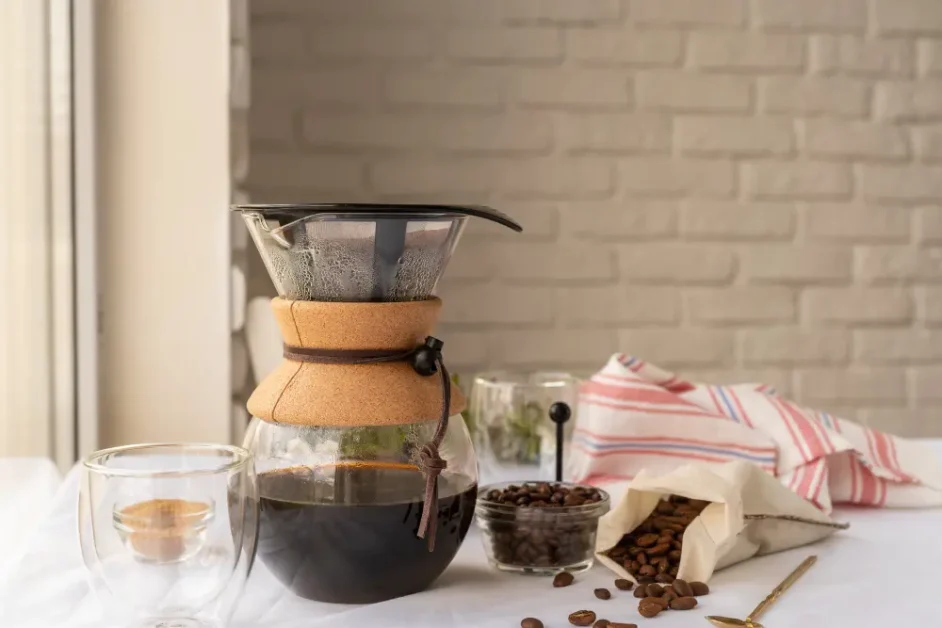
Factors Can Affect Your Choice Between The Electric Percolators vs. Manual Pour Overs
Individual interests and objectives influence the debate between manual pour-over and electric coffee percolators. Electric percolators are handy and offer features like automatic shut-off and customizable settings.
Nevertheless, they could require greater control through the brewing procedure and be less energy-efficient. On the other hand, manual pour-over coffee machines provide greater control over the brew strength and taste, but they take more effort and time to operate.
Whenever it refers to brewing time, grind size, noise level, aesthetics, taste, durability, cleanliness, simplicity of usage, portability, capacity, filtration, and temperature control, both techniques offer advantages and disadvantages.
Ultimately, the choice between electric percolators and manual pour-over coffee makers boils down to personal tastes and preferences regarding flavor, comfort, and brewing management.
Conclusion
Personal choice and brewing needs dictate what you should utilize between an electric percolator vs. manual pour overs coffee maker. Electric coffee percolators are great for individuals wishing to brew big amounts of coffee quickly and precisely.
Meanwhile, the manual pour-over coffee makers are better suited to individuals who prefer manually brewing their coffee and enjoy the minor subtleties in flavor which come with the manual pouring technique.

